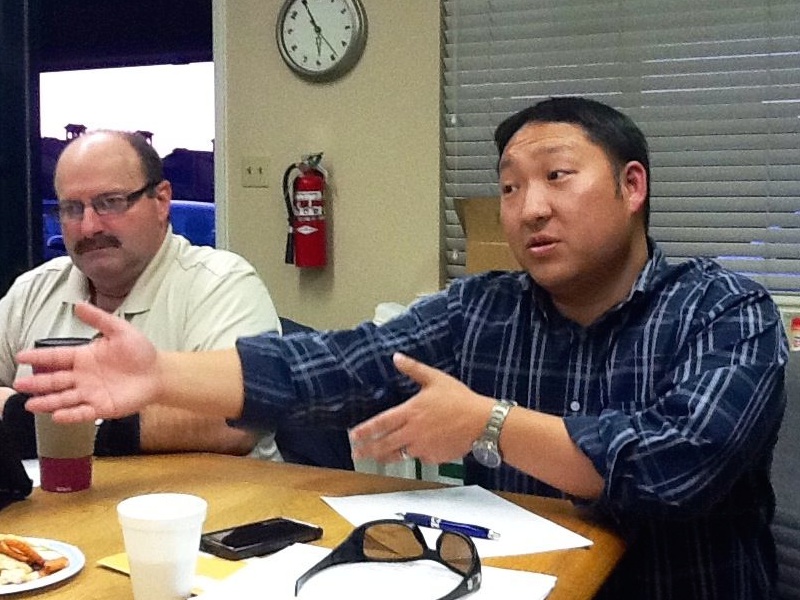Frank Oliveira says that he and a group of Central Valley farmers who oppose Gov. Jerry Brown’s “bullet train” plan are getting really good at playing whack-a-mole.
The co-chair of Citizens for California High-Speed Rail Accountability (CCHSRA) says that with every setback they soldier on. Last Wednesday’s news that the California Supreme Court declined their petition to review a major case regarding funding for the construction of the $68 billion bullet train project was met with disappointment, but not surprise.
“We really would’ve liked the Supreme Court to have participated in this matter, but we can’t make them hear the case; we don’t have that kind of juice,” says Oliveira, whose family owns farmland affected by the rail project. “But everything wasn’t hinging on them.”
“It’s a disappointing setback for the citizens of California,” says Aaron Fukuda, a plaintiff for the Kings County lawsuit the Supreme Court declined to review, and a member of the CCHSRA. “In light of today’s current atmosphere in Sacramento, it’s clear the government is in control of the people, and the people are not in control of the government.”
He says he doesn’t understand how a project that could spell financial ruin for the state doesn’t rise to the importance of a review by the state Supreme Court, which declined to comment on the case. The decision came during a meeting not open to the public, with only one member voting to hear the case.
“This decision reaffirms that the authority can continue building a modern high-speed rail system that connects the state, creates jobs and complies with the law,” said Dan Richard, chairman of the California High-Speed Rail Authority board, in a statement. “We will continue to move forward aggressively to deliver the nation’s first high-speed rail system.”
Oliveira says the rail’s victory party could be premature.
“Talk radio has this fatalistic spin on this thing, that all the obstacles are out of the way,” he says. “And who knows? Maybe they’re right. But I believe legally we can still do our part so this thing is fully aired out…so if they do go forward, we’ll be able to show they’re breaking the law.”
Oliveira is referring to the second part of the Kings County lawsuit, which is set for trial in early 2015. He says the first part, which the Supreme Court declined to review, challenged the rail authority’s funding plan. The second part focuses on four key issues, all requirements of the 2008 Proposition 1A ballot initiative and bond measure that allocated funds for the rail authority. The issues are:
- whether or not the train can go from L.A. to San Francisco in two hours and 40 minutes;
- whether it can it operate without a subsidy;
- if it is even logistically possible to operate the train on the routes that the state is laying out under the plan;
- and whether or not the so-called “blended plan,” which utilizes existing rail lines, is in violation of the ballot initiative since the voters never approved a blended system.
In addition to the Prop. 1A lawsuit, there are more litigation challenges, including environmental impact and eminent domain challenges, and the legality of using cap-and-trade as a financing device.
Fukuda says his group intends to persevere.
“We’re a bunch of farmers, and farmers are the ultimate testament to living through adversarial and tough conditions,” he says.
“We’re going through a drought, and we’ve been attacked by regulations. We still get food to the markets everyday. It’s a greater good we represent. We’re just asking if you’re gonna build this train, do it right.
“If the project dies, it’s not because of us. It’s because the high speed rail authority has a bad plan. They come out, pistols blazing, and a lot of times it’s pointed down at their feet.”
Oliveira says the upside to this three-year saga is he’s gotten to know his neighbors.
“We’ve met every Monday since July of 2011,” he says. “These people are soldiers.
“When you look at them, they don’t look like Stallone or the ‘Expendables.’ We don’t have berets or tank tops. We’re farmers who’ve come together to protect this community.”
Heidi Siegmund Cuda produced and hosted the Fox 11 economic series, “Saving the California Dream,” which featured dozens of reports on the bullet train.
Photo courtesy Shelli Andranigian/CCHSRA

COMMENTS
Please let us know if you're having issues with commenting.